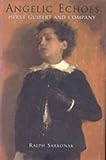Angelic Echoes : Hervé Guibert and Company / Ralph Sarkonak.
Material type: TextSeries: University of Toronto Romance SeriesPublisher: Toronto : University of Toronto Press, [2000]Copyright date: ©2000Description: 1 online resource (342 p.) : 21 b&w illustrationsContent type:
TextSeries: University of Toronto Romance SeriesPublisher: Toronto : University of Toronto Press, [2000]Copyright date: ©2000Description: 1 online resource (342 p.) : 21 b&w illustrationsContent type: - 9780802047946
- 9781442670853
- 843/.914 22
- PQ2667.U4612 Z87 2000eb
- online - DeGruyter
| Item type | Current library | Call number | URL | Status | Notes | Barcode | |
|---|---|---|---|---|---|---|---|
 eBook
eBook
|
Biblioteca "Angelicum" Pont. Univ. S.Tommaso d'Aquino Nuvola online | online - DeGruyter (Browse shelf(Opens below)) | Online access | Not for loan (Accesso limitato) | Accesso per gli utenti autorizzati / Access for authorized users | (dgr)9781442670853 |
Browsing Biblioteca "Angelicum" Pont. Univ. S.Tommaso d'Aquino shelves, Shelving location: Nuvola online Close shelf browser (Hides shelf browser)

|

|

|

|

|

|

|
||
| online - DeGruyter Analytical Political Philosophy : From Discourse, Edification / | online - DeGruyter Andreas and the Ambiguity of Courtly Love / | online - DeGruyter Andrés González de Barcia and the Creation of the Colonial Spanish American Library / | online - DeGruyter Angelic Echoes : Hervé Guibert and Company / | online - DeGruyter Anglo-Saxon England in Icelandic Medieval Texts / | online - DeGruyter Animal Rights, Human Rights : Ecology, Economy, and Ideology in the Canadian Arctic / | online - DeGruyter Anti-Italianism in Sixteenth-Century France / |
restricted access online access with authorization star
http://purl.org/coar/access_right/c_16ec
In 1990 Hervé Guibert gained wide recognition and notoriety with the publication of "A l'ami qui ne m'a pas sauvé la vie (To the Friend Who Did Not Save My Life)". This novel, one of the most famous AIDS fictions in French or any language, recounts the battle of the first-person narrator not only with AIDS but also with the medical establishment on both sides of the Atlantic. Photography critic for Le Monde from 1977-1985, Guibert was also the co-author (with Patrice Chéreau) of a film script, L'Homme Blessé, which won a César in 1984, and author of more than twenty-five books, eight of which have been translated into English.In this vibrant and unusual study, Ralph Sarkonak examines many intriguing aspects of Guibert's life and production: the connection between his books and his photography, his complex relationship with Roland Barthes and with his friend and mentor Michel Foucault (relationships that were at once literary, intellectual, and personal in each case); the ties between his writing and that of his contemporaries, including Renaud Camus, France's most prolific gay writer; and his development of an AIDS aesthetic. Using close textual analysis, Sarkonak tracks the convolutions of Guibert's particular form of life-writing, in which fact and fiction are woven into a corpus that evolves from and revolves around his preoccupations, obsessions, and relationships, including his problematic relationship with his own body, both before and after his HIV-positive diagnosis.Guibert's work is a brilliant example of the emphasis on disclosure that marks recent queer writing-in contrast to the denial and cryptic allusion that characterized much of the work by gay writers of previous generations. Yet, as Sarkonak concludes, Guibert treats the notions of falsehood and truth with a postmodern hand: as overlapping constructs rather than mutually exclusive ones - or, to use Foucault's expression, as "games with truth."
Mode of access: Internet via World Wide Web.
In English.
Description based on online resource; title from PDF title page (publisher's Web site, viewed 01. Nov 2023)


